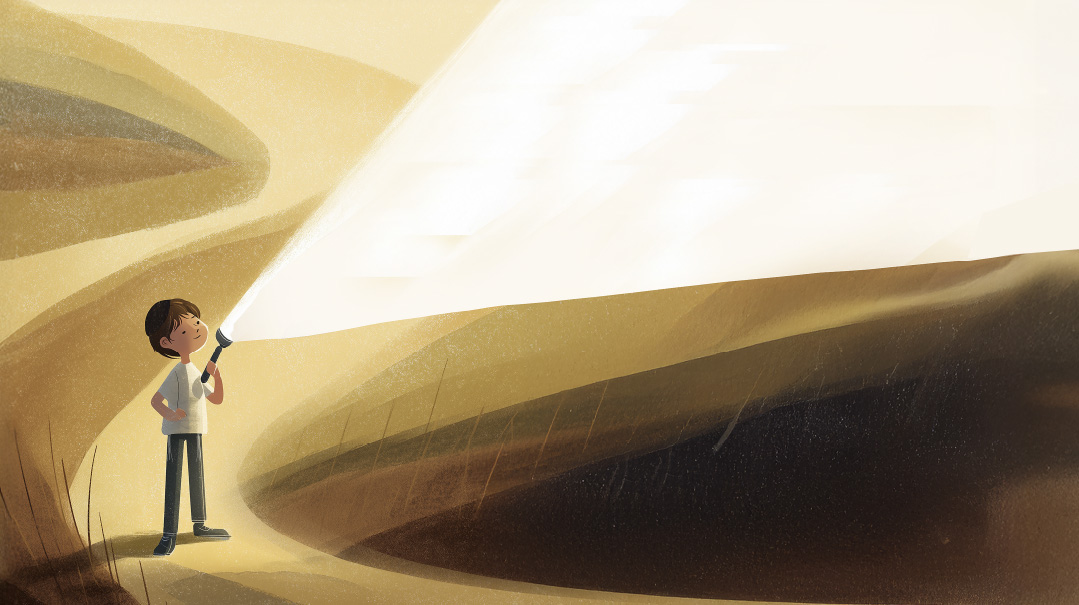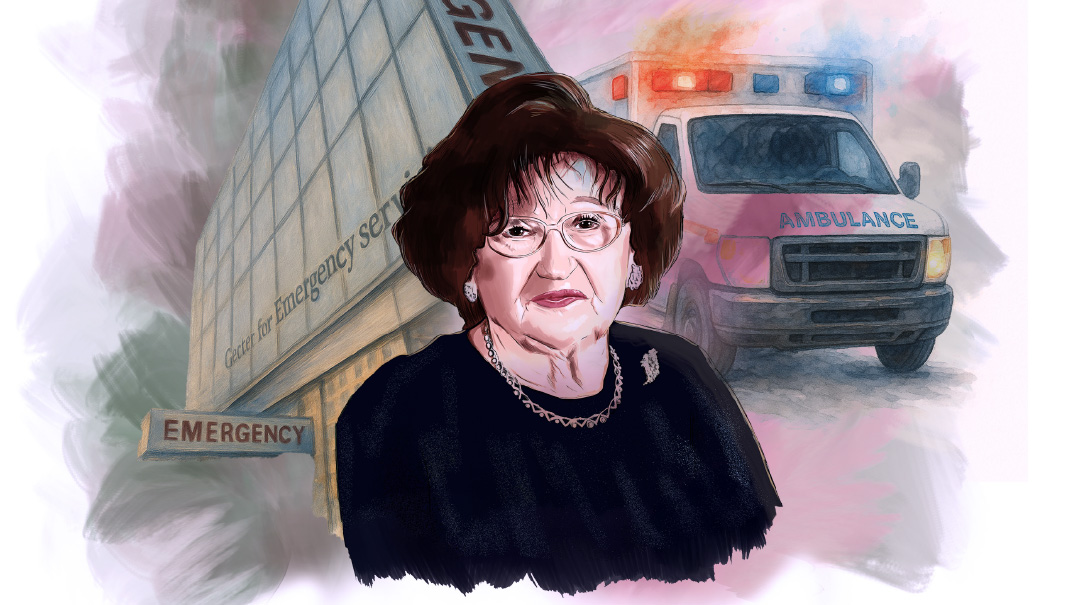Heart Full of Faith
| September 26, 2023With devotion and awe, the Ishah HaShunamis hosted the Navi Elisha — and in return for her kindness, merited a twofold miracle

A chill wind blew through the verdant Jezreel Valley, bringing the promise of rain. Golden fields lined the horizon; within them, sheep grazed and bleated. In the distance, a man spotted Elisha the prophet, accompanied by his attendant Gechazi. The two were making their way to the great city of Shunem in the portion of the tribe Yissachar.
“Look!” he cried. “Here comes the navi Elisha! He has come to our city!”
“I wonder where he’ll be staying,” the man said.
“He will surely stay at the home of the Shunamite woman, the wife of the navi Ido,” the man responded. “Whenever a tzaddik arrives in the city, she begs to serve them in her home.”
“It’s no surprise,” said a third. “The Shunamite is the sister of Avishag, who was the wife of Dovid Hamelech. She owns a vast estate.”
“The prophet won’t stay there because of her wealth,” countered another. “Her greatness lies in her kindness and hospitality, her eagerness to welcome guests into her home.”
“We must learn from her,” the first man said. “Wherever you find generosity of heart, you find greatness, while he who guards his wealth too much and refrains from doing good is called an evil soul. And not only that, but through generosity, a person attains greatness in This World and in the Next.”
In no time, the rumor of the prophet’s approach spread through the city, until it reached the ears of the Ishah Hashunamis.
“A prophet is coming to our city?” she exclaimed, clapping her hands in delight. “Welcoming a tzaddik and sharing property with him is like bringing a korban tamid or bikkurim. I’ll go straightaway to invite him to my home.”
The Shunamite ran, inclined her head humbly before the tzaddik and said to him: “Please, come rest and refresh yourselves at my house. The Creator has blessed me with wealth and means — it will be my honor to host you.”
Elisha turned to his student. “I have learned from my rabi and master, Eliyahu Hanavi, not to accept anything at the expense of the tzibbur,” he said. “Eliyahu Hanavi always brought his own candles and wicks so as not to burden his hosts. I don’t want to be the beneficiary of gifts. But this woman is pleading with us from the depths of her heart — I don’t want to refuse her. We’ll go to her, even though I suspect she simply wants to derive honor from hosting us.”
Delighted at having found guests, the Shunamite returned home to fix a seudah for the navi.
“What’s bothering you?” her servants chided her. “Why are you slaving away for a seudas chag? It’s Rosh Hashanah today, when the Book of Life and the Book of Death are opened, and mortal creatures are sentenced to life or death. Is it not more fitting to fast on this day?”
“You’re right. Today is Rosh Hashanah. Today, judgment is passed on the world,” the Shunamite answered. “But today is also the day that the childless are remembered. Today is a chag for Hashem, and we eat and drink in the confidence that we will be found innocent at our trial!”
Elisha rested in the Shunamite’s home, and when morning arrived, he and his servant set off.
After he left, the Shunamite turned to her husband. “I know that the navi didn’t truly wish to stay in our home. He only did so to make me happy. I invited him because I knew that he was a holy man of G-d,” she said.
“How do you know?”
“I could tell from the way he ate and from the fact that no flies flew above his table. Also, the sheets he slept on last night carry the fragrance of Gan Eden.
“I have an idea,” she continued. “Let’s build a small attic for the prophet to stay in whenever he visits the city.”
“Why does he need his own attic?” Ido wondered. “Are the guest quarters not enough for him?”
“They’re enough for most people, but not for a navi. A tzaddik is like a king, and it’s forbidden to make use of his things. Also,” she added, “it would be good if he has his own place, for hisbodedus and tefillah.”
“I sense an ulterior motive for your request,” Ido observed. “What’s on your heart?”
“Well,” the Shunamite answered. “You know that any woman who gazes on the radiance of the prophet’s face dies immediately. That’s why Elisha hides himself in the caves and mountains.”
“Yes, Elisha merited for the Shechinah to dwell on his face,” Ido explained. “Because all of the days of his life, he has always been careful never to look at the face of a rasha. Only he and Moshe Rabbeinu share this attribute, and it is because of this that he is greater than the other prophets.”
“Right, and women are going to be tempted to look at his face. So it would be better if he had a separate room,” the Shunamite pointed out. “But I won’t do a thing without your approval.”
“You are a modest and humble woman,” her husband said. “Do what you think is proper, but be careful about the laws of yichud.”
The Shunamite woman had an attic with a separate entrance built on the top of the house. Inside, she placed a bed, a table, a chair, and a menorah. “Look,” she told her servants. “The objects I placed here are roshei teivos for the word ‘mishkan,’ for this place will be a holy sanctuary for a prophet of Hashem. And know, all of you, that whoever hosts a talmid chacham in his home brings blessing upon himself.”
“My lady,” one of the servants objected, “the attic is so small. Will it be enough for the prophet?”
“It is small, but you’ll see that a miracle like the one with the Aron Hakodesh will occur here,” the Shunamite promised. “Just as the Aron was not limited by size, this tiny room will be big enough for everything the navi needs.”
“And why did you arrange everything so particularly?” asked the observant servant.
“I put the bed before the table, because travelers first want to sleep to recover from their journey, and only then do they eat,” she answered. “And the menorah they only need at night.”
“But why didn’t you let us help you set everything up?” the servant wondered. “There’s no need for you to work so hard.”
“Work hard?” laughed the Shunamite. “It’s a zechus to honor Hashem’s servants! Don’t you know that whoever treats talmidei chachamim with respect will merit to have a son-in-law who’s a talmid chacham, and those who love talmidei chachamim merit to have sons who are talmidei chachamim, and those who fear talmidei chachamim become talmidei chachamim themselves — and if they aren’t capable of it, their words will be heard as a talmid chacham’s words.”
“May it truly be so,” the servant nodded. “May it be that in the zechus of your mitzvah of hachnassas orchim you’ll merit to have a son, as we see with Avraham Avinu who hosted the angels and merited to have a son.”
It was a good year for Shunem.
The winter rains watered the fields, and the fertile valley brimmed with golden wheat. The harvest went by, summer ended, and on Rosh Hashanah Elisha was again seen coming to Shunem to bring Hashem’s word to the people.
As always, Elisha went to lodge in the attic of the Isha Hashunamis. Thankful to this woman who took care of his every need, he instructed his servant, Gechazi, to summon her so he could reward her for her efforts.
“Rabi, the woman gave you nothing but a bed, a menorah, a chair, and a table,” Gechazi pointed out. “Was this really so much trouble?”
“Quiet,” commanded Elisha. “One must always be grateful for even little favors. The woman brought me a bed, a chair, a menorah, and a table, and I will offer her anything in the world.”
Gechazi rushed to bring the Shunamite, and she stood in the doorway, careful not to look at the navi’s face. Elisha did not address the woman directly, but turned to his servant. “Gechazi, tell the Shunamite that I’ve seen the great concern she has taken for our sake. At first I thought she did it to derive honor from her guests, but when she built us an attic above her house I realized that her actions were for the sake of Heaven. Ask her what I can do for her. Can I speak on her behalf to the king?”
“My master,” the Shunamite replied, “B’soch ami ani yosheves — I dwell among my nation, who will take care of me. I have nothing to ask of a king of flesh and blood.”
“You know that today marks the birth of the world, today all of the world’s creations stand before Him in judgment. Hashem is standing and judging each creation. I will plead before Him on your behalf.”
“No,” the woman demurred. “I don’t want you to single me out in your tefillah. I am worried to stand alone in judgment and have my every action examined so closely. I prefer to be judged as part of Am Yisrael, to be judged together with them, and to pray that together, as a klal, we all merit to be forgiven.”
The Shunamite went back down into her home.
“This woman is greater than all of the other women in the world!” Elisha exclaimed. “Gechazi, what shall we do for her?”
“She has no children,” the servant said.
“Is that true?” Elisha was horrified. “Why didn’t she say anything?”
“Perhaps she has given up hope,” offered Gechazi. “Her husband is old and she is barren; it would take a double miracle to give them a child.”
“But Hashem is all-powerful!” the prophet proclaimed. He ordered Gechazi to call the woman back.
The Shunamite hurried back to the attic, stood at the doorway, and lowered her gaze.
As soon as she appeared, Elisha began speaking directly to her, confident in the promise that Hashem fulfills a tzaddik’s decrees.
“At this time next year you will be embracing a son!” Elisha promised, hinting that the baby would receive an embrace from his mother as well as from the prophet.
The Shunamite stood in the doorway to the attic silent and shaken. After so many years of pain she had lost hope.
“Don’t,” she whispered to the prophet. “Please don’t mislead your maidservant… for you said I should embrace the child, and not that I would raise him to a good long life, and what’s the point of embracing a son if I’m destined to bury him? I beg of you, beg for mercy on my behalf, and let me not have a son unless he is to survive.”
The Shunamite woman continued, pointing out: “When the angels came to Sarah and informed her that at that time next year she would embrace a child, they promised to return to her, and you didn’t promise me this.”
“How can I promise to return?” Elisha asked. “Angels are immortal — they can promise to return. But I am a creature of flesh and blood who lives today and could die tomorrow. And when I said that you would embrace a son rather than that you would give birth to a son, it was to hint that you won’t have the pain of pregnancy and childbirth. Your faith in the blessing of a tzaddik gave the blessing great strength. But,” he added, “words shape reality.” Since you said your son might die, he might die.”
Nine months went by, and the home of the Shunamite woman resounded with joy — she had given birth to a son, thanks to the prophet’s blessing.
“Blessed be Hashem who chose true prophets and had mercy on a poor soul…” the Shunamite said to the infant that lay cradled in her arms. “I will call your name Chavakkuk, after the embrace (chibuk) that the prophet Elisha promised me.”
Years passed, Chavakkuk grew, and one day he left his house and ran to the field where his father was overseeing the reapers. “Ido, your son has come to the field,” one of the reapers cried, pointing at the child. “The child has grown — he is no longer a baby.”
“Indeed,” the father said proudly. “Though I don’t understand why he’s here. He should be learning Torah. He was born thanks to a prophet’s blessing, so he must grow to be a prophet himself.”
“Leave him be,” laughed the reapers. “Let him have some fun.”
Chavakkuk skipped over the sheaves and wandered through the fields of wheat, heedless of the scorching sun. After a while his head began to hurt.
“My head, my head!” Chavakkuk began wailing.
“Ido, what shall we do with the child,” the reapers cried in alarm. “He seems unwell, perhaps he is suffering from sunstroke?”
“Bring the child to his mother,” Ido commanded. “I’m sure she’ll be able to heal his hurt.”
The reapers carried the child back to his worried mother.
“What happened to you, Chavakkuk?” the Shunamite whispered to her child, setting him on her knee.
“My lady,” the servants said in alarm, “shall we bring medicine?”
“Don’t bring anything,” the Shunamite declared. “There’s no point trying to heal him with medicine. This is not a natural illness. Only the prophet can help him.”
Chavakkuk sat on his mother’s knee. And at the heat of the day, when the sun was at its zenith, his soul left him.
The Shunamite woman didn’t lose her courage or tranquility. She had Elisha’s promise that her son would live, and she was sure that just as she’d had a child through his blessing, the navi would be able to revive her son. “I see that the prophet was right,” she said. “Words shape reality. From now on, I shall no longer use the word ‘dead.’ But just as the prophet was able to put the child in my womb, I am confident that he will be able to revive him.”
She brought Chavakkuk upstairs and placed him on the prophet’s bed, where the fragrance of Gan Eden emanated.
“Send me one of the servants and a donkey,” the Shunamite cried to her husband. “I want to go to the man of G-d.”
“To the prophet?” Ido said with surprise. “But our son is ill.”
“I will hurry and return quickly,” the Shunamite responded, not wishing to cause her husband pain by telling him that their son was dead.
“But why today?” Ido pressed her. “It is not Rosh Chodesh or Shabbos today.”
“I go on a mission of peace!” cried the Shunamite, but she didn’t explain to her husband that the peace she was trying to make was between their son’s body and soul.
Ido was still unsure about his wife’s spontaneous journey. “Listen, my wife,” he said, “I’m concerned about issur yichud, since the roads are empty. After all, it is neither Rosh Chodesh nor Shabbos.”
“Don’t worry,” replied the Shunamite, “this is a time of peace, and there are others traveling. In any case, I will take a young servant, so there is no concern.”
Ido assented and gave her a servant boy to accompany her to Mt. Carmel, where the prophet was to be found.
“Sit on the donkey and drive it swiftly,” the Shunamite instructed the boy. “Don’t stop unless I tell you.”
The boy nodded, jumped on the donkey’s back, and immediately set off, with the Shunamite following on foot, in harrowing sorrow.
The two advanced toward the towering Mt. Carmel, with only faith in tzaddikim sustaining the Shunamite.
Elisha was standing on the mountain, when he espied the Shunamite woman ascending the mountain.
“I see the Shunamite woman approaching. Sadness is etched on her face… what happened to her?” the prophet wondered in alarm. He was accustomed to knowing everything, but the reason for the woman’s approach was hidden from him.
“Gechazi,” he instructed his servant, “go to the woman and see how she, her husband, and her son are doing.”
The Shunamite woman answered Gechazi with one word. “Shalom.” She knew she must speak with the navi, who was the one who had promised her a son. The woman continued climbing up the mountain, and when she arrived, she threw herself before the prophet and clung to his legs.
Gechazi rushed forward to push her away, but Elisha cried out: “Let her go, for her spirit is bitter.” He pushed Gechazi backward and warned, “If you drive her away now, you are cruel, ungrateful, and a chassid shoteh (pious fool).”
Then Elisha turned to the woman. “Hashem has hidden from me why you have come.”
The Shunamite woman raised her eyes and burst into bitter tears. “Did I request a son of my master? I told you before he was born not to mislead me with a child destined to die young.”
The prophet understood that something had happened to the child he had promised her and that the woman was wisely not explicit so as not to seal his fate. “Now I know why Hashem hid your son’s hurt from me,” he said. “It was to spur you to take the trouble to come to me and render yourself deserving of a miracle. If I had known of your son’s condition, I would have come to you, and you would not have had this merit in your favor.”
Elisha took the staff that was in his hand, etched the name of G-d into it, and extended it to Gechazi. “Take my staff in your hand, go quickly to the Shunamite’s home and place it on the lad’s face. Don’t dally on the way and don’t stop to speak with anyone, for I wish to conceal the miracle to avoid ayin hara.”
“And the staff will work a miracle?” Gechazi asked skeptically. He lacked faith in techiyas hameisim.
“Yes,” replied Elisha. “The Shunamite supports tzaddikim and revives them with food and drink. Middah k’neged middah she will merit that HaKadosh Baruch Hu will revive her child.”
At that point Elisha thought the child had merely lost consciousness, and the staff would wake him up. He did not know that the child was dead and would need a miracle of techiyas hameisim.
Gechazi took the staff and set off for Shunem, but contrary to his master’s instructions he tarried, and told anyone who asked: “Me, I’m off to resurrect the dead.”
Soon, Gechazi saw a dead lion at the side of the road.
“If the staff in my hand can raise the dead,” he thought to himself, “then let the lion stand and live.”
Gechazi placed the staff upon the dead lion, and it was immediately revived, letting out a terrible roar. Gechazi jumped back in fright. He realized that he had squandered the staff’s power, yet still he continued onward to the Shunamite’s home.
When he arrived at the house, he ascended to the attic and placed the staff on the child’s face, but the child didn’t move.
Gechazi realized his error: By telling everyone of his mission, ayin hara had possessed Chavakkuk, and therefore the miracle could not occur at Gechazi’s hand.
At that same hour, on Mt. Carmel, the Shunamite clung to Elisha’s legs and pleaded. “Chai Hashem, and by your life, I will not leave you. Please, come to my house, for I do not trust Gechazi to effect this miracle.”
“Had you believed in him, he would have succeeded,” observed Elisha. “And you can learn from this that the main zechus in techiyas hameisim is the innocent faith in the words of the prophet. The reason Hashem concealed the child’s condition from me was to try your faith; because you believed in me, your son will live.”
Elisha followed the Shunamite woman’s request. They walked toward Shunem and on the way met Gechazi.
“The child didn’t waken,” Gechazi said shamefacedly. “Forgive me, rabi, I thought I was as great as you, but now I see that I cannot bring back the dead.”
“You have already received your punishment, Gechazi,” said Elisha. “Your entire body is covered in sores.”
When they arrived at the woman’s home, Elisha hurried up to the attic and saw the child sleeping in his bed.
“There is no sign of decay,” Elisha muttered, trying in vain to awaken the child. It seemed that the tzaddik’s bed had spared him from any signs of death. The child looked as though he were sleeping.
Elisha looked into the child’s face, trying to discern his type of death. There are two categories of deaths in this world: Either a person completes their appointed life span, or they die a premature death caused by sin. Resurrection is easier in the latter case.
But Elisha recognized that the child had simply completed his appointed life span; he would need to pray passionately to bring the child back.
Elisha closed the door and began to daven. “Now the child and I are equal, and I won’t open the door until either he lives or I die.” By offering his life for the child, Elisha defied nature, thus meriting a miracle that defied nature.
Then Elisha approached the bed and lay upon the child, warming him with his body, to prepare his body and make the miracle seem as natural as possible. He put his mouth on the child’s mouth — to resuscitate him, and to return the power of speech to him, and he placed his eye on the child’s eye to arouse his power of emotions and his mind and restore his sense of sight. He put his palms on the child’s palms to give him the power of action. And when the three parts of the body were prepared, Elisha prostrated himself on the child seven times, hinting at the 70 years of his life. In between, Elisha would stand up and walk through the attic to increase the power of the tefillah.
After that, Elisha called the child by his name, and immediately Hashem sent the dew of life and revived him. The child sneezed seven times and the spirit of life coursed through him.
Elisha saw that the child was alive, hurried to his servant, and told him: “Go summon the Shunamite.”
The woman hurried to the attic and looked at her son, but instead of falling into his arms, she ran to the prophet and fell before his feet.
“Take your son,” Elisha told the Shunamite. “Go to the land of Pelishtim; there will be a famine here, and I don’t want him to die.
“And know,” he added to the tzadeikes, “that your son, young Chavakkuk, has been elevated to the level of a prophet.”
(Originally featured in Family First, Issue 862)
Oops! We could not locate your form.







